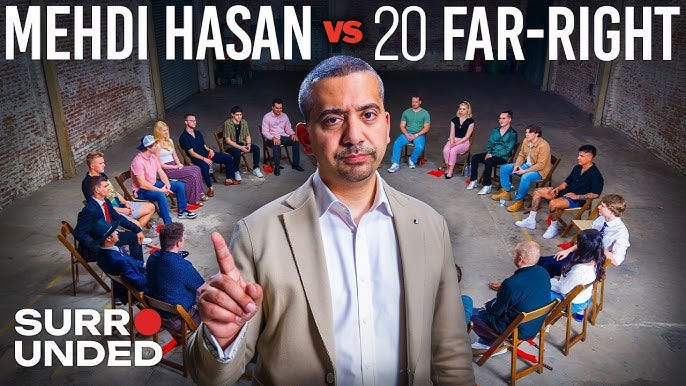Outrage, Inc: The meme-ification of political debate
Political discourse, once a realm of measured arguments and thoughtful deliberation, has devolved into a hyper-stylized, gladiatorial sport, custom-built for viral consumption. This is more than merely a shift; it’s transforming complex issues into digestible, outrage-fueled "content." Nowhere is this more glaringly evident than in the phenomenon of YouTube shows like Jubilee’s "Surrounded," which have masterfully perfected the dark art of packaging raw indignation for a global audience.
"Surrounded" thrives on a simple, yet wickedly effective, premise: take a prominent figure, or someone with a deeply held conviction, and throw them into a ring with 20 or more ideological adversaries. It's a pressure cooker, designed to extract visceral reactions and ignite explosive confrontations. While Jubilee may claim to seek common ground, the brutal truth is that these episodes often serve as a centrifuge for conflict, elevating extreme viewpoints and morphing serious discussions into a performative, entertainment-first spectacle. There can still be a “greater good” in creating the content and getting it out to the masses — we’ll get back to that — but first we have to understand the framework of this format.
Take, for instance, the recent spectacle featuring Mehdi Hasan attempting to debate 20 self-described "far-right conservatives." The internet exploded. The video wasn't just a viral hit because of Hasan's incisive takedowns; it was the jaw-dropping pronouncements from some of his opponents that truly set the digital world aflame. Whispers quickly morphed into confirmed reports: individuals, including one unblinking self-proclaimed "fascist," were swiftly identified by online sleuths and subsequently fired from their jobs – a direct consequence of the speech they freely expressed on camera. This isn't just "content" anymore; this is real-world fallout, directly fueled by a model that thrives on monetizing the very outrage it manufactures.
And full disclosure, for what it's worth: I've even been approached by Jubilee myself about joining the "Surrounded" fray. While the concept is undeniably compelling, scheduling complexities and one cancellation of a scheduled date on their end have, so far, kept me out of the arena. It’s possible that at some point I might participate, if they come back to me about scheduling.
Before the recent election, I had my own viral moment on the Sean Mike Kelly show, explaining to him that American companies are ultimately the ones who pay the cost of tariffs imposed by the US.
He was visibly shocked, and that simple, almost benign, piece of information exploded, racking up 30 million views across platforms. The shock value alone, divorced from any clear 'good or bad' judgment, propelled it into the digital stratosphere. That's the power of this new, emotionally charged media landscape.
The magnetic pull of "Surrounded" and programs like it lies in their brutal efficiency at delivering instant gratification and a potent hit of catharsis. For viewers, it’s a chance to witness their own simmering political frustrations externalized and, often, validated as opposing viewpoints are "dismantled" – or, sometimes more accurately, caricatured and dismissed. The show’s gamified structure, with its "red flag" system empowering the group to vote out a debater, transforms genuine discourse into a competitive sport, where the loudest, most outrageous pronouncements are rewarded with viral infamy. It's a feedback loop that prioritizes the sensational over the sensible, the dramatic over the deliberative.
The insidious danger, however, is that by offering a grand stage for these fringe ideologies, even under the guise of "debate," these shows risk legitimizing and amplifying truly dangerous narratives. The raw pursuit of clicks and ad revenue means shock value reigns supreme, creating a perverse incentive to sacrifice substance for spectacle. This isn't just about entertainment; it's about a fundamental distortion of political discourse, where nuance is obliterated by soundbites, and the true goal isn't persuasion or understanding, but the generation of explosive, reaction-driven content.
This “mem-ification” of debates isn't confined to a single show; it has infected the very bloodstream of our public conversations. Social media, with its algorithms designed to reward division and outrage, acts as a supercharger, turning every fleeting political thought into a potential flashpoint for viral contention.
Ultimately, the rise of "Surrounded" and its brethren is a grim reflection of our insatiable appetite for politics as raw, unvarnished entertainment. While I don’t believe any individual who chooses to participate, be it Mehdi Hasan, or me, is doing anything wrong per se, the important analysis is more systemic. While these platforms can, at times, throw a blinding spotlight on the fault lines that fracture our societies, we must remain fiercely vigilant about the true cost. When outrage becomes the ultimate currency, and when the sacred line between genuine discourse and performative spectacle blurs into oblivion, we risk not only trivializing the most critical issues of our time but, far more disturbingly, inadvertently empowering the very extremism we claim to be dissecting.
Paid memberships make articles like this possible. Your support helps cover the time, research, and work that go into each piece. If you find value in what you’re reading, consider becoming a paid Substack subscriber—it keeps this work going.




Debating or arguing, whatever you want to call this it's being done with children. These kids haven't lived. Their thinking skills come from sparing with the internet, not human beings. Their quick thinking quips are meant to burn the other side not learn or teach anything. This is getting the attention it doesn't deserve because we are allowing them to think they're right when they're not. Bad ideas, bad inclinations and bad values should not be amplified to this extent without being called out immediately. Kids talking about adulthood without being adults is fiction, put them in life circumstances for 8 to 10 years, then come back to me.
That Jubilee debate was like watching a multi-car wreck and not being able to look away.